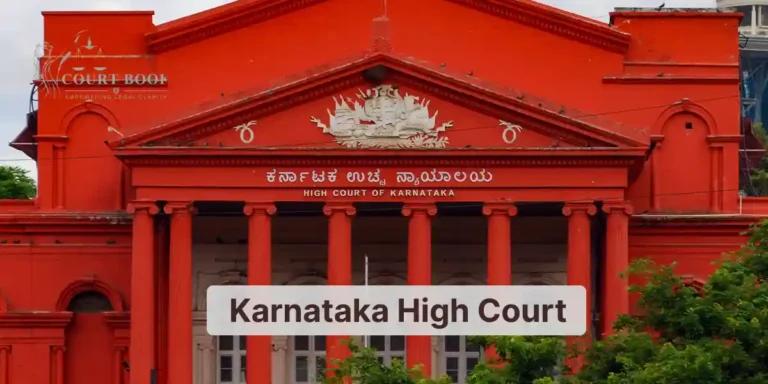The Karnataka High Court, on Thursday, March 27, reserved its decision on the Enforcement Directorate’s (ED) application, which sought a stay on the single judge’s order quashing the summons issued to Dr. Natesha DB, the former Commissioner of the Mysore Urban Development Authority (MUDA). The division bench, comprising Chief Justice N. V. Anjaria and Justice K. V. Aravind, reserved its ruling after hearing arguments from both parties.
During the proceedings, Additional Solicitor Generals S. V. Raju and Aravind Kamath, representing the ED, contended that the single judge’s order had effectively halted the investigation. They argued that the order was fundamentally flawed and could impact future search operations.
"The judgment of the single judge is per incuriam, and if it is prima facie incorrect, it should be stayed," the agency’s counsel asserted.
Single Judge's Decision Declared ED’s Action Invalid
Previously, the single judge had allowed Dr. Natesha DB’s plea, ruling that the ED's search and seizure at his residence, as well as the subsequent statement recorded under Section 17(1)(f) of the Prevention of Money Laundering Act (PMLA), were invalid due to the lack of "reason to believe." As a result, the court declared these actions illegal and quashed the summons issued under Section 50 of the Act.
The ED has now appealed against this order and is seeking an interim stay to prevent it from being used as a precedent in future cases.
"No Criminal Activity, No Proceeds of Crime": Respondent's Counsel
Read also:- Karnataka High Court Orders Probe Against Judge for Citing Non-Existent Supreme Court Judgments
Senior Advocate Dushyant Dave, appearing for Dr. Natesha DB, argued that the case did not involve money laundering.
"Here is a case where the government is granting plots to landholders. Where is the question of money laundering? There is no money derived from criminal activity, which is a prerequisite for the ED’s jurisdiction," he stated.
Dave highlighted that the land was allotted to CM Siddaramaiah’s wife, Smt. Parvathi, as part of a policy decision by MUDA, and not due to any criminal activity.
"Allotment of plots is part of government policy, a statutory exercise. It has nothing to do with a crime," he emphasized.
Court Questions ED's Jurisdiction
At this stage, the bench noted that under PMLA, proceeds of crime are not limited to money alone. However, Dave responded by insisting that such proceeds must still stem from a criminal act.
"There are no proceeds of crime here. Governments, irrespective of political parties, have made such allotments for decades. Will the ED reopen all those cases and prosecute innocent citizens? That is the question before this court today," he asserted.
He further argued that an "innocent government action" should not be treated as a crime, as it is beyond the agency’s power.
"The single judge’s judgment is not perverse; it is a well-reasoned and just decision. If a government policy has been implemented consistently for three decades, should we now condemn people under this Act? That is a serious issue," he added.
"ED Lacks Reason to Believe for Action Under PMLA"
Dave also raised the crucial issue of the "reason to believe" required for ED to initiate action under PMLA.
Read also:- Karnataka High Court Directs State to Develop Common IT Portal for Co-operative Societies Compliance
"An inquiry can only begin when there is a reason to believe. Mere suspicion or doubt does not qualify. The Supreme Court in Jyoti Prasad v. Haryana (1993) has ruled that ‘reason to believe’ is a higher level of state of mind than mere suspicion," he explained.
The single judge had called for the reasons behind the ED’s action, but upon reviewing the agency’s submissions in a sealed cover, found them insufficient.
"I have not seen a greater abuse of power than this," Dave remarked.
Concerns Over Constitutional Rights and Political Influence
Highlighting the broader implications, Dave argued that arbitrary ED actions were instilling fear among citizens and destabilizing governments.
"Article 21 includes the right to goodwill, peace of mind, and reputation. Across the country, individuals are afraid of receiving ED notices under Section 50. Why are only opposition states like Tamil Nadu and Karnataka facing such scrutiny? Your lordships must protect constitutional rights and see the motive behind this exercise," he urged.
He further argued that ED was engaging in a "fishing inquiry," with no concrete evidence.
"I have simply executed my duties per the Constitution and MUDA’s policies. Why should I be penalized? Imagine what my neighbors must think when ED raids my house. Am I some corrupt bureaucrat or a drug trafficker?" he questioned.
"ED’s Powers Are Not Unbridled"
Dave contended that the ED sought an immediate stay to issue multiple summonses without valid grounds. He emphasized that in his client’s search, no incriminating evidence was found except a mobile phone.
Read also:- Karnataka HC Hears ED's Plea Against Order Quashing Summons to Former MUDA Commissioner
"Allotting 14 plots is not money laundering. What is happening in this country? This is not the authority the Supreme Court granted in Vijay Madanlal Chaudhary v. UOI. The single judge ruled that there was no reasonable belief, and the ED cannot act arbitrarily," he stated.
ED's Counterarguments
In response, ASG Kamath argued that the single judge had failed to recognize that there was a prima facie case. He stated that proceeds of crime included any benefits derived from a criminal activity.
"Summoning under Section 50 of PMLA is for investigation purposes. We registered an ECIR based on a predicate offence complaint by Snehamayi Krishna, which alleged thousands of illegal site allotments by MUDA," Kamath explained.
He insisted that a former commissioner would have knowledge of relevant documents and that the sites in question were allotted due to undue influence from powerful individuals.
"The criminal activity here is that influential persons directed the Commissioner to allot the sites. Once an FIR is registered, I have the power to summon him. The writ court cannot examine whether a predicate offence was committed," he contended.















